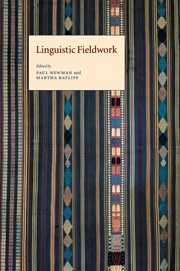Book contents
- Frontmatter
- Contents
- List of figures
- List of tables
- Notes on contributors
- Introduction
- 1 Fieldwork as a state of mind
- 2 Who shapes the record: the speaker and the linguist
- 3 Places and people: field sites and informants
- 4 Ulwa (Southern Sumu): the beginnings of a language research project
- 5 Escaping Eurocentrism: fieldwork as a process of unlearning
- 6 Surprises in Sutherland: linguistic variability amidst social uniformity
- 7 The role of text collection and elicitation in linguistic fieldwork
- 8 Monolingual field research
- 9 The give and take of fieldwork: noun classes and other concerns in Fatick, Senegal
- 10 Phonetic fieldwork
- 11 Learning as one goes
- 12 The last speaker is dead – long live the last speaker!
- Index
6 - Surprises in Sutherland: linguistic variability amidst social uniformity
Published online by Cambridge University Press: 05 June 2012
- Frontmatter
- Contents
- List of figures
- List of tables
- Notes on contributors
- Introduction
- 1 Fieldwork as a state of mind
- 2 Who shapes the record: the speaker and the linguist
- 3 Places and people: field sites and informants
- 4 Ulwa (Southern Sumu): the beginnings of a language research project
- 5 Escaping Eurocentrism: fieldwork as a process of unlearning
- 6 Surprises in Sutherland: linguistic variability amidst social uniformity
- 7 The role of text collection and elicitation in linguistic fieldwork
- 8 Monolingual field research
- 9 The give and take of fieldwork: noun classes and other concerns in Fatick, Senegal
- 10 Phonetic fieldwork
- 11 Learning as one goes
- 12 The last speaker is dead – long live the last speaker!
- Index
Summary
The last thing I would have expected to find in populations of exceptional social uniformity is marked individual linguistic variability, but that's exactly what I did find in long-term fieldwork with Scottish Gaelic in Sutherland, in the far north of mainland Scotland. I didn't originally set out to go to Sutherland, and I wasn't in search of linguistic variability when I arrived there. En route to explaining how Sutherland became my research site and what I found in it, I propose to look at some general issues in field research: What entices a student linguist into the field? How usefully can a research project be focused before the researcher is personally familiar with the field site? When is a fieldwork project “finished”? And finally, how do the professional and the personal experiences of fieldwork conflict or balance?
The library or the field?
A student making routine progress through an academic program volunteers for some discomfort in leaving the familiar academic environment for a fieldwork setting. Entering an unfamiliar social world is guaranteed to plunge the novice researcher into something like a second adolescence: a constant succession of uncomfortable situations in which he or she has no clear idea how to behave and is very likely to behave inappropriately. There must be some substantial inducements to coax the student forth, as of course there are: the excitements of novelty and discovery, and the satisfactions of making a first real trial of professional skills.
- Type
- Chapter
- Information
- Linguistic Fieldwork , pp. 133 - 151Publisher: Cambridge University PressPrint publication year: 2001
- 6
- Cited by



